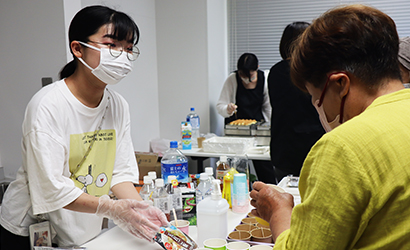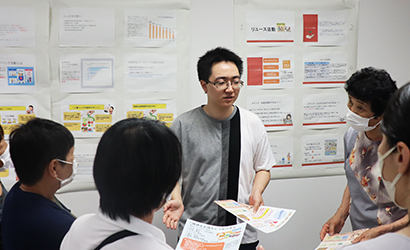JIU Josai International University

An event to support local "food" Planned by students aiming to become welfare professionals and nurses
Faculty Department
2023.07.25

Student (left) demonstrating how to eat disaster food

A student (center) answering a participant's question about food loss
The “Hot Station in Josai International University” event was held on July 18th at Chiba Togane Campus, distributing free rice and baby sponge cakes that are about to expire, and introducing disaster food for the elderly. did. A total of 21 people, Masako Ito, a fourth-year seminar student in Faculty of Social Work Studies Department of Social Work Studies and Satoko Iga, a first- and second-year student in Faculty of Nursing Department of Nursing planned a community development where "government, private sector, and residents" can work together. It was realized by co-sponsoring with the specified non-profit organization "Link" (secretariat: Sanmu City, Chiba Prefecture).
The first initiative between our university and the link was an on-campus-only event held in January this year with the aim of supporting students who are suffering from soaring living costs due to rising prices. At that time, Link provided stockpiled rice and emergency food. . Inspired by the activities of the rink, the students decided to plan a second event, saying, "Next time, I would like everyone in the community to visit," and not only the campus but also the local residents.
At this event, we created three panels, "Food loss countermeasures," "Reuse activities," and "Disaster food for the elderly," and hung them up at the venue. Regarding food loss countermeasures and reuse activities, the students listened to the rink's daily efforts and researched disaster food on their own, and summarized each. After the students explained the content of the three cards, questions were raised from the audience, such as, "Japan seems to have the largest amount of food waste in Asia. Why do you think that is the case?" Based on the knowledge they gained from the preparations with the members of the rink, the students said, "I think one of the factors is that the expiration date is set shorter in Japan compared to other countries. There seems to be a strong tendency to judge food that has lost even the slightest color as 'cannot be eaten anymore'," he said, exchanging opinions on how to reduce food loss. did.
Subsequently, we distributed disaster food and stockpiled rice with near expiration dates provided by Togane City Hall and links to participants. The baby castella handmade by the students was also well received, and one of the students who visited the venue said with a smile, "I'm grateful for the rice distribution because the high cost of living has made my family's finances difficult." Local residents commented, "It was a lot of fun talking to the students. I'd like to see the event held again." It was also a chance to feel close to.
The student who planned the event seemed to be pleased with the response, saying, "Many of them learned how to eat disaster food deliciously for the first time, so I'm glad I was able to introduce them."